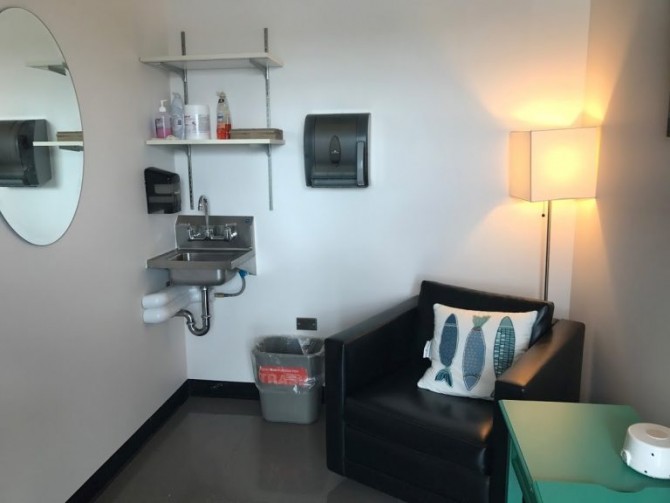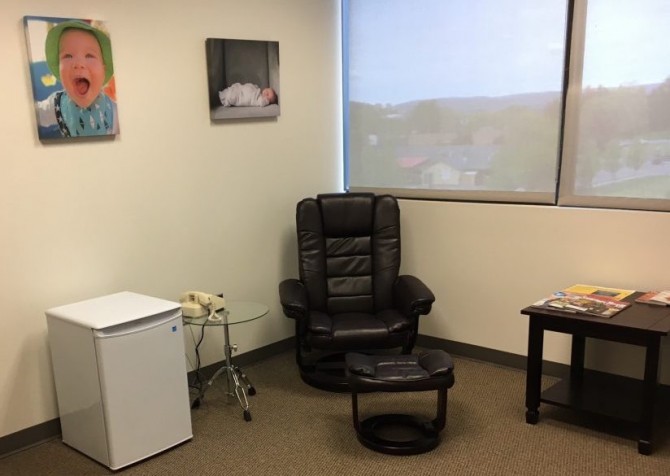Lactation rooms receive grant from Cornell alumnae
By Ashley Fazio
Every year, more than 200 infants are added to Cornell’s employee health insurance plans, and the number of breastfeeding mothers in the workplace – on-campus and nationally – continues to climb, said Michelle Artibee, associate director for work/life in Human Resources.
In fall 2015, there were 35 designated lactation spaces on campus for use by faculty, staff, students and visitors, funded from departmental resources. A campus-wide plan was needed to ensure that all mothers across campus could have nearby access to appropriate lactation facilities.
A $7,000 grant from the President’s Council for Cornell Women (PCCW) provided impetus for that plan. Contributions from Human Resources; Infrastructure, Properties and Planning; and the Graduate School have been added to the PCCW grant to support a larger Lactation Room Improvement Project.
“We are so grateful to the women leaders of PCCW,” said Mary Opperman, vice president and chief human resources officer. “They provide wise counsel and real support to many of us here at Cornell and the impact of their efforts can be found across campus.”
Noting that “PCCW seeks to advance the involvement and leadership of women students, faculty, staff and alumnae at Cornell University,” Ana G. Chapman ’93, president of JHL Capital Group LLC, and vice-chair of the PCCW grants committee, said, “The Lactation Room Improvement Project plays an important role in helping mothers continue their pursuit of ambitious professional and academic paths at Cornell, while nurturing their babies. Many of us PCCW members are mothers who are raising and have raised children while pursuing rigorous academic and professional careers. We recognize the difficulties of the balancing act, and know that accommodations around issues like childcare are essential for professional success, personal and overall family well-being.”
When Artibee submitted the proposal to PCCW at the end of 2015, she hoped to improve the conditions of two to four campus lactation rooms. “Cornell has been at the forefront of support for mothers for some time – ahead of the U.S. Affordable Care Act and the New York State Labor Law 503c,” said Artibee. “Thanks to the PCCW grant and partnership of campus departments, four new rooms have been created and 13 others improved with amenities such as comfortable and easy to clean seating, mini refrigerators, sound machines, lamps, tables, mirrors, and bulletin boards.”
Many rooms were also in need of improvements such as signage, paint, flooring, and paper towel dispensers. “We continue to look for ways to enhance the quality of life for working parents and newborns,” Artibee said.
One of the newly created rooms was in Kennedy Hall, a space used by Ashlee McGandy, content strategist for the Office of Engagement Initiatives.
After her first child was born, working and pumping, she said, was easy. “I was in the ideal scenario – the room was right above my office, and it had a fridge, a sink and a lock on the door. I felt supported and thought it was easy to come back to work and pump.”
A few years later while pumping with her second child, McGandy found that not all spaces were created equal. “Our offices moved to Kennedy Hall in January 2017,” she said. At that time, the closest room was in the Cornell Computing and Communications Center. “I would have to go outside in the middle of winter and schedule longer breaks throughout the day, but it wasn’t that far, so I went to see the space – it was a chair in a shower stall. I had committed to pump for at least a year, but I remember thinking, ‘Am I really going to be able to do it this time?’”
McGandy was going to “make it work,” but a conversation with a colleague eventually led to further talks with Artibee, and the new room in Kennedy soon followed.
The grant and the supplemental support from partners across campus resulted in a much broader impact, according to Artibee, by splitting the cost of establishing a room or making improvements equally between the grant and the department(s) in a building. “I have been amazed by the receptivity and support from those I’ve worked with in the colleges and units across campus – this project wouldn’t have been successful without their investments of time and resources too.”
“While employers such as Cornell are required to provide time away from work to pump and private locations to do so, the nuances of this support can have a tremendous impact on the duration of time a mother breastfeeds,” Artibee said. “Research has found that workplace breastfeeding support alone has a 3-to-1 return on investment through lower health care costs, absenteeism and turnover.”
McGandy acknowledges supervisor and extended office support as the most important aspect in making both of her scenarios work. “There was a culture of support among my colleagues, but also a feeling that the policies were in place to enable me to do what was best for me and my children,” she said. “The support made it easier to come back and be a working parent. I think it’s natural to question if this is what you should be doing. But when things are easy and smooth, it makes you realize that you can do it if that's the decision you make for yourself and your family.”
Artibee and her colleagues in Work/Life offer free on-campus educational workshops on a variety of topics each semester, including two in the Preparing for Baby series on the topic of breastfeeding. They also work with mothers and supervisors to address lactation accommodations, time away from work, child care needs, and more.
For more information and photographs, visit the online directory of lactation rooms at https://blogs.cornell.edu/mothersrooms.
Ashley Fazio is director of communications in the Division of the Vice President and Chief Human Resources Officer.
Media Contact
Get Cornell news delivered right to your inbox.
Subscribe
